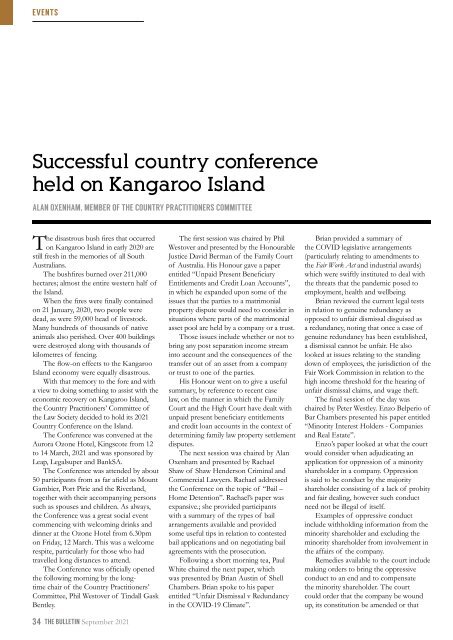LSB September 2021 LR
You also want an ePaper? Increase the reach of your titles
YUMPU automatically turns print PDFs into web optimized ePapers that Google loves.
EVENTS<br />
Successful country conference<br />
held on Kangaroo Island<br />
ALAN OXENHAM, MEMBER OF THE COUNTRY PRACTITIONERS COMMITTEE<br />
The disastrous bush fires that occurred<br />
on Kangaroo Island in early 2020 are<br />
still fresh in the memories of all South<br />
Australians.<br />
The bushfires burned over 211,000<br />
hectares; almost the entire western half of<br />
the Island.<br />
When the fires were finally contained<br />
on 21 January, 2020, two people were<br />
dead, as were 59,000 head of livestock.<br />
Many hundreds of thousands of native<br />
animals also perished. Over 400 buildings<br />
were destroyed along with thousands of<br />
kilometres of fencing.<br />
The flow-on effects to the Kangaroo<br />
Island economy were equally disastrous.<br />
With that memory to the fore and with<br />
a view to doing something to assist with the<br />
economic recovery on Kangaroo Island,<br />
the Country Practitioners’ Committee of<br />
the Law Society decided to hold its <strong>2021</strong><br />
Country Conference on the Island.<br />
The Conference was convened at the<br />
Aurora Ozone Hotel, Kingscote from 12<br />
to 14 March, <strong>2021</strong> and was sponsored by<br />
Leap, Legalsuper and BankSA.<br />
The Conference was attended by about<br />
50 participants from as far afield as Mount<br />
Gambier, Port Pirie and the Riverland,<br />
together with their accompanying persons<br />
such as spouses and children. As always,<br />
the Conference was a great social event<br />
commencing with welcoming drinks and<br />
dinner at the Ozone Hotel from 6.30pm<br />
on Friday, 12 March. This was a welcome<br />
respite, particularly for those who had<br />
travelled long distances to attend.<br />
The Conference was officially opened<br />
the following morning by the longtime<br />
chair of the Country Practitioners’<br />
Committee, Phil Westover of Tindall Gask<br />
Bentley.<br />
34 THE BULLETIN <strong>September</strong> <strong>2021</strong><br />
The first session was chaired by Phil<br />
Westover and presented by the Honourable<br />
Justice David Berman of the Family Court<br />
of Australia. His Honour gave a paper<br />
entitled “Unpaid Present Beneficiary<br />
Entitlements and Credit Loan Accounts”,<br />
in which he expanded upon some of the<br />
issues that the parties to a matrimonial<br />
property dispute would need to consider in<br />
situations where parts of the matrimonial<br />
asset pool are held by a company or a trust.<br />
Those issues include whether or not to<br />
bring any post separation income stream<br />
into account and the consequences of the<br />
transfer out of an asset from a company<br />
or trust to one of the parties.<br />
His Honour went on to give a useful<br />
summary, by reference to recent case<br />
law, on the manner in which the Family<br />
Court and the High Court have dealt with<br />
unpaid present beneficiary entitlements<br />
and credit loan accounts in the context of<br />
determining family law property settlement<br />
disputes.<br />
The next session was chaired by Alan<br />
Oxenham and presented by Rachael<br />
Shaw of Shaw Henderson Criminal and<br />
Commercial Lawyers. Rachael addressed<br />
the Conference on the topic of “Bail –<br />
Home Detention”. Rachael’s paper was<br />
expansive.; she provided participants<br />
with a summary of the types of bail<br />
arrangements available and provided<br />
some useful tips in relation to contested<br />
bail applications and on negotiating bail<br />
agreements with the prosecution.<br />
Following a short morning tea, Paul<br />
White chaired the next paper, which<br />
was presented by Brian Austin of Shell<br />
Chambers. Brian spoke to his paper<br />
entitled “Unfair Dismissal v Redundancy<br />
in the COVID-19 Climate”.<br />
Brian provided a summary of<br />
the COVID legislative arrangements<br />
(particularly relating to amendments to<br />
the Fair Work Act and industrial awards)<br />
which were swiftly instituted to deal with<br />
the threats that the pandemic posed to<br />
employment, health and wellbeing.<br />
Brian reviewed the current legal tests<br />
in relation to genuine redundancy as<br />
opposed to unfair dismissal disguised as<br />
a redundancy, noting that once a case of<br />
genuine redundancy has been established,<br />
a dismissal cannot be unfair. He also<br />
looked at issues relating to the standing<br />
down of employees, the jurisdiction of the<br />
Fair Work Commission in relation to the<br />
high income threshold for the hearing of<br />
unfair dismissal claims, and wage theft.<br />
The final session of the day was<br />
chaired by Peter Westley. Enzo Belperio of<br />
Bar Chambers presented his paper entitled<br />
“Minority Interest Holders - Companies<br />
and Real Estate”.<br />
Enzo’s paper looked at what the court<br />
would consider when adjudicating an<br />
application for oppression of a minority<br />
shareholder in a company. Oppression<br />
is said to be conduct by the majority<br />
shareholder consisting of a lack of probity<br />
and fair dealing, however such conduct<br />
need not be illegal of itself.<br />
Examples of oppressive conduct<br />
include withholding information from the<br />
minority shareholder and excluding the<br />
minority shareholder from involvement in<br />
the affairs of the company.<br />
Remedies available to the court include<br />
making orders to bring the oppressive<br />
conduct to an end and to compensate<br />
the minority shareholder. The court<br />
could order that the company be wound<br />
up, its constitution be amended or that


















